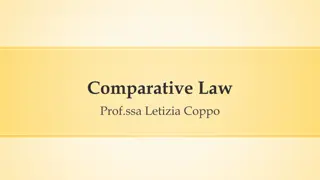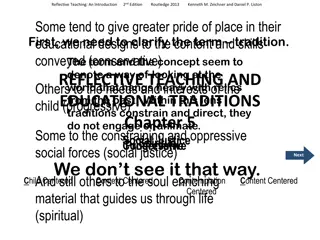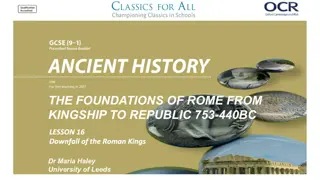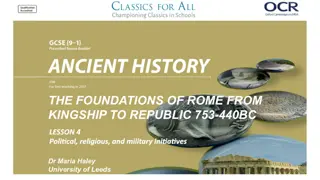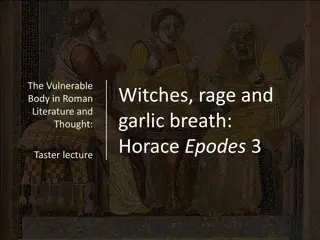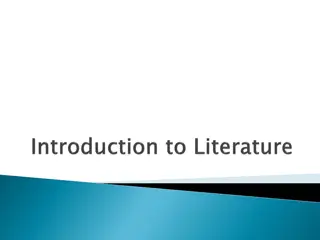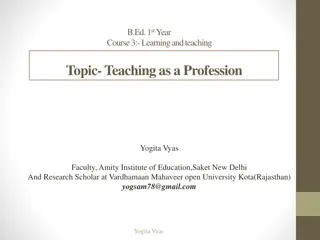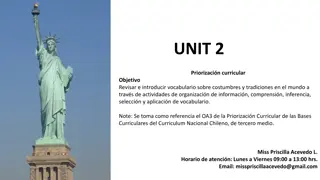Traditions of Teaching Roman Private Law in Europe
Explore the rich history and teaching traditions of Roman Private Law in Europe, starting from the Bolognese School of Glossators to the influential figures like Azo of Bologna. Discover how teaching methods like the Quaestiones Sabbatinae and the use of Justinian law books have shaped legal education over centuries.
Uploaded on Sep 12, 2024 | 0 Views
Download Presentation

Please find below an Image/Link to download the presentation.
The content on the website is provided AS IS for your information and personal use only. It may not be sold, licensed, or shared on other websites without obtaining consent from the author. Download presentation by click this link. If you encounter any issues during the download, it is possible that the publisher has removed the file from their server.
E N D
Presentation Transcript
Traditions of Teaching (Roman) Private Law in Europe University of Gda sk 16 October 2023 Johannes Platschek
I. Teaching Roman Law as Timeless Private Law Azo of Bologna (ca 1150-1230) Quaestiones Sabbatinae
Bolognese School of Glossators: Irnerius - Bulgarus - Joannes Bassianus - Azo - Accursius Teaching the Justinian law books (529-534 AD): Institutiones = textbook for first-year students Digesta/Pandectae = collection from scientific legal literature (mostly 2nd/3rdcentury AD) Codex Iustinianus = collection of imperial constitutions (2ndto 6thcentury AD)
Azo famous for Summa Codicis; Summa Institutionum; later also: Summa Digestorum = synthetic and condensed representation of the Justinian law books Lectura Codicis = transcript of teaching lessons on the Codex Justinianus Brocardica aurea = Golden Weaponry , collection of legal maxims with supporting and contradicting passages from the Justinian law books
Quaestiones Sabbatinae Saturday Disputes Moot court tradition: Small written case and passages from the Justinian law books Students will plead, teacher will comment. Since 1252: obligatory for all Bolognese doctores of the ius civile and the ius canonicum. Transcripts of the Quaestiones of Azo have survived and were published by E. Landsberg in 1888.
Quaestio X (Landsberg 71.20 - 75.17; cf. Aulus Gellius, Noctes Atticae 5,10)
Plaintiff (P): "Won litigation" to be interpreted broadly, not only as litigation with a third party. If P started the first litigation only to let D win and the condition occur, this is not bad faith (dolus) but permissible pursuit of own interests, arguing with Digest 42,8,24: Civil law is written for the vigilant. If D failed to formulate a narrower condition ( won litigation against a third party ), he has to blame himself and bear the loss.
Defendant (D): It must not benefit P that D won against him in the first litigation. It is unjust that P would have an action being founded in his wickedness (loosing intentionally the first litigation). Won litigation in the sense of the condition has to be one lucrative for the buyer. It cannot be his own case against the seller. Hence the condition has not been occurred, the action not justified, arguing (from far away!) with Digest 13,7,22,4 (?): Recourse claims of a pledgor only in case of lucrative pledge sale.
Solution/Azo: The narrower interpretation according to meaning and purpose is more likely, arguing with Digest 50,17,114: In obscure cases one must examine what is more likely or more common.
Justinian law books as a treasure trove for timeless legal arguments. Studying law is learning to find the argument within the (more or less) memorized text masses. Rhetorical/topical impact.
II. Teaching Roman Law after the Codification of Private Law since then: Roman law as a propaedeutic exercise? Legal laboratory working with a set of rules, destilled from ancient sources?
From the perspective of dogmatic history, the contemporary objects of Roman law are often irrelevant to the ratio: many sources deal with the law of slavery, for example. In very few cases, however, the ratio of a decision changes if slave is replaced by used car , for example. Ch. Baldus, AcP 210 (2010) 22
III. Teaching Roman Law as a Historical Legal System ancient social, economic and mentally impacts procedural view open discussions (ius controversum) purpose: critical view on modern concepts, categories, principles
German Civil Code (B rgerliches Gesetzbuch) 162. Preventing or bringing about the occurrence of a condition. (1) If the occurrence of the condition is prevented in bad faith by the party to whose disadvantage it would be, the condition is considered as if it had occurred. Debtor owes because of ficticious occurrence of the condition.
Digest 35,1,24 pr. (Iul. 55 dig.; mid IIndAD) = 50,17,161 (Ulp. 77 ed.; early IIIrdAD) Debtor owes because of ficticious occurence of the condition. Different cases. Solution by fiction not shared by all in every case!
Fiction necessary (and widely shared), if creditor can enforce his right in natura (e.g. his freedom/manumission: ancient impact). D. 40,7,3,16 (Ulp. 27 Sab.): conditioned manumission by testament
Fiction not necessary (and not widely shared: ius controversum), if creditor can anyway enforce only compensation in money (condemnatio pecuniaria: procedural view). D. 18,1,50 pr. (Ulp. 11 ed.): conditioned sale compensation by actio praescriptis verbis [not the sale action; that means: Labeo does not work with the fiction]."
In modern law there is the principle of enforceable performance in natura, compensation in money is secondary. Therefore, fiction is always necessary (critical view on modern principles).






